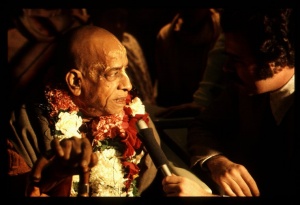SB 10.60.47: Difference between revisions
m (1 revision(s)) |
(Vanibot #0054 edit - transform synonyms into clickable links, which search similar occurrences) |
||
| (One intermediate revision by one other user not shown) | |||
| Line 1: | Line 1: | ||
{{info | {{info | ||
|speaker=Queen | |speaker=Queen Rukmiṇī the Goddess of Fortune | ||
|listener=Lord | |listener=Lord Kṛṣṇa the Supreme Personality of Godhead | ||
}} | }} | ||
[[Category:Srimad-Bhagavatam - Canto 10 Chapter 60]] | |||
[[Category:Bhagavatam Verses Spoken by Queen Rukmini - Vanisource|106047]] | |||
<div style="float:left">'''[[Srimad-Bhagavatam]] - [[SB 10|Tenth Canto]] - [[SB 10.60: Lord Krsna Teases Queen Rukmini|Chapter 60: Lord Kṛṣṇa Teases Queen Rukmiṇī]]'''</div> | |||
<div style="float:right">[[File:Go-previous.png|link=SB 10.60.46]] '''[[SB 10.60.46]] - [[SB 10.60.48]]''' [[File:Go-next.png|link=SB 10.60.48]]</div> | |||
{{RandomImage}} | |||
{{SBnotice}} | |||
==== TEXT 47 ==== | ==== TEXT 47 ==== | ||
<div | <div class="verse"> | ||
naivālīkam ahaṁ manye | :naivālīkam ahaṁ manye | ||
vacas te madhusūdana | :vacas te madhusūdana | ||
ambāyā eva hi prāyaḥ | :ambāyā eva hi prāyaḥ | ||
kanyāyāḥ syād ratiḥ kvacit | :kanyāyāḥ syād ratiḥ kvacit | ||
</div> | </div> | ||
| Line 17: | Line 22: | ||
==== SYNONYMS ==== | ==== SYNONYMS ==== | ||
<div | <div class="synonyms"> | ||
''[//vanipedia.org/wiki/Special:VaniSearch?s=na&tab=syno_o&ds=1 na]'' — not; ''[//vanipedia.org/wiki/Special:VaniSearch?s=eva&tab=syno_o&ds=1 eva]'' — indeed; ''[//vanipedia.org/wiki/Special:VaniSearch?s=alīkam&tab=syno_o&ds=1 alīkam]'' — false; ''[//vanipedia.org/wiki/Special:VaniSearch?s=aham&tab=syno_o&ds=1 aham]'' — I; ''[//vanipedia.org/wiki/Special:VaniSearch?s=manye&tab=syno_o&ds=1 manye]'' — think; ''[//vanipedia.org/wiki/Special:VaniSearch?s=vacaḥ&tab=syno_o&ds=1 vacaḥ]'' — words; ''[//vanipedia.org/wiki/Special:VaniSearch?s=te&tab=syno_o&ds=1 te]'' — Your; ''[//vanipedia.org/wiki/Special:VaniSearch?s=madhu&tab=syno_o&ds=1 madhu]-[//vanipedia.org/wiki/Special:VaniSearch?s=sūdana&tab=syno_o&ds=1 sūdana]'' — O killer of Madhu; ''[//vanipedia.org/wiki/Special:VaniSearch?s=ambāyāḥ&tab=syno_o&ds=1 ambāyāḥ]'' — of Ambā; ''[//vanipedia.org/wiki/Special:VaniSearch?s=eva&tab=syno_o&ds=1 eva] [//vanipedia.org/wiki/Special:VaniSearch?s=hi&tab=syno_o&ds=1 hi]'' — certainly; ''[//vanipedia.org/wiki/Special:VaniSearch?s=prāyaḥ&tab=syno_o&ds=1 prāyaḥ]'' — generally; ''[//vanipedia.org/wiki/Special:VaniSearch?s=kanyāyāḥ&tab=syno_o&ds=1 kanyāyāḥ]'' — the maiden; ''[//vanipedia.org/wiki/Special:VaniSearch?s=syāt&tab=syno_o&ds=1 syāt]'' — arose; ''[//vanipedia.org/wiki/Special:VaniSearch?s=ratiḥ&tab=syno_o&ds=1 ratiḥ]'' — attraction (to Śālva); ''[//vanipedia.org/wiki/Special:VaniSearch?s=kvacit&tab=syno_o&ds=1 kvacit]'' — once. | |||
</div> | </div> | ||
{{SBcollapse}} | |||
==== TRANSLATION ==== | ==== TRANSLATION ==== | ||
<div | <div class="translation"> | ||
Actually, I don't consider Your words false, Madhūsudana. Quite often an unmarried girl is attracted to a man, as in the case of Ambā. | Actually, I don't consider Your words false, Madhūsudana. Quite often an unmarried girl is attracted to a man, as in the case of Ambā. | ||
</div> | </div> | ||
| Line 31: | Line 36: | ||
==== PURPORT ==== | ==== PURPORT ==== | ||
<div | <div class="purport"> | ||
Having refuted everything Lord Kṛṣṇa said, Śrīmatī Rukmiṇī, in a gracious frame of mind, now praises the truthfulness of His statements. In other words, she accepts that Lord Kṛṣṇa used her as an example to elucidate ordinary female psychology. The King of Kāśī had three daughters—Ambā, Ambālikā and Ambikā—and Ambā was attracted to Śālva. This story is narrated in the Mahābhārata. | Having refuted everything Lord Kṛṣṇa said, Śrīmatī Rukmiṇī, in a gracious frame of mind, now praises the truthfulness of His statements. In other words, she accepts that Lord Kṛṣṇa used her as an example to elucidate ordinary female psychology. The King of Kāśī had three daughters—Ambā, Ambālikā and Ambikā—and Ambā was attracted to Śālva. This story is narrated in the ''Mahābhārata''. | ||
</div> | </div> | ||
__NOTOC__ | </div> | ||
</div> | |||
<div style="float:right">[[File:Go-previous.png|link=SB 10.60.46]] '''[[SB 10.60.46]] - [[SB 10.60.48]]''' [[File:Go-next.png|link=SB 10.60.48]]</div> | |||
__NOTOC__ | |||
__NOEDITSECTION__ | |||
Latest revision as of 19:36, 17 February 2024

A.C. Bhaktivedanta Swami Prabhupada
Please note: The synonyms, translation and purport of this verse were composed by disciples of Śrīla Prabhupāda
TEXT 47
- naivālīkam ahaṁ manye
- vacas te madhusūdana
- ambāyā eva hi prāyaḥ
- kanyāyāḥ syād ratiḥ kvacit
SYNONYMS
na — not; eva — indeed; alīkam — false; aham — I; manye — think; vacaḥ — words; te — Your; madhu-sūdana — O killer of Madhu; ambāyāḥ — of Ambā; eva hi — certainly; prāyaḥ — generally; kanyāyāḥ — the maiden; syāt — arose; ratiḥ — attraction (to Śālva); kvacit — once.
Translation and purport composed by disciples of Śrīla Prabhupāda
TRANSLATION
Actually, I don't consider Your words false, Madhūsudana. Quite often an unmarried girl is attracted to a man, as in the case of Ambā.
PURPORT
Having refuted everything Lord Kṛṣṇa said, Śrīmatī Rukmiṇī, in a gracious frame of mind, now praises the truthfulness of His statements. In other words, she accepts that Lord Kṛṣṇa used her as an example to elucidate ordinary female psychology. The King of Kāśī had three daughters—Ambā, Ambālikā and Ambikā—and Ambā was attracted to Śālva. This story is narrated in the Mahābhārata.